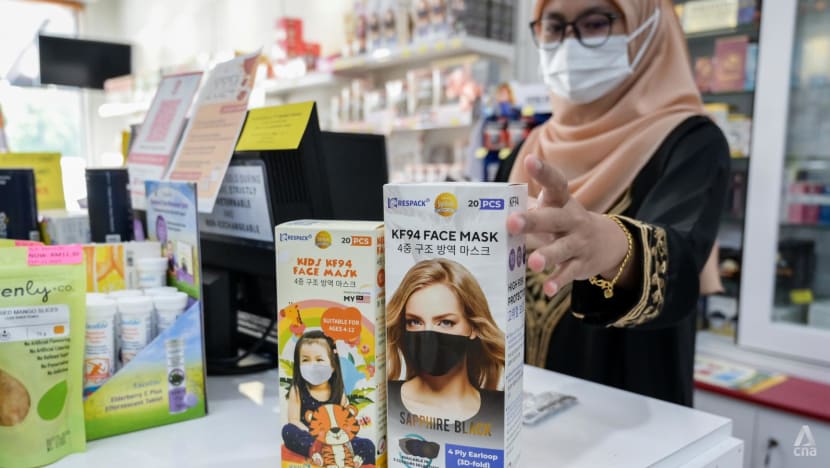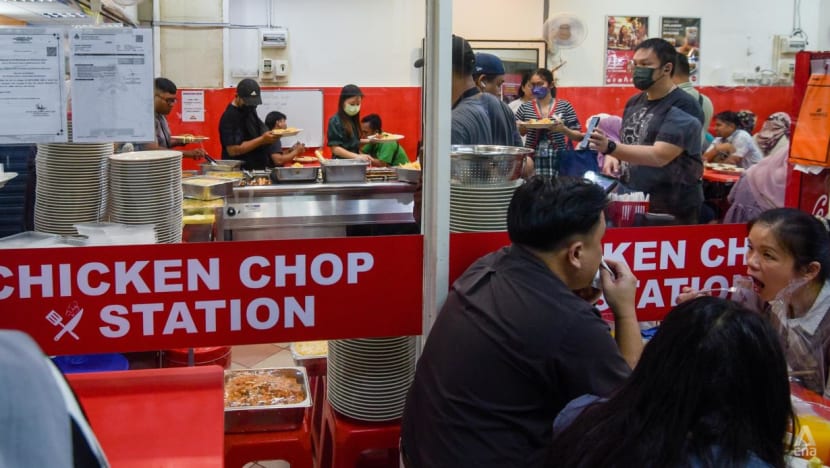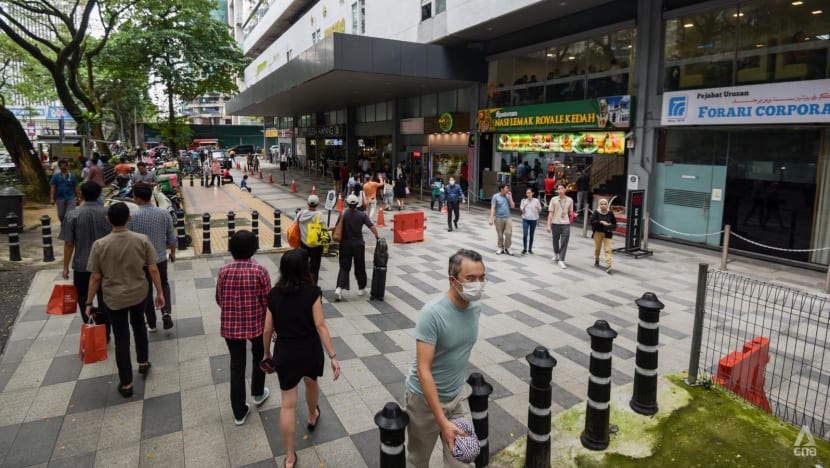COVID-19 surge in Southeast Asia: Experts stress personal responsibility, dismiss need for pandemic-era curbs
Health experts in the region say the public must continue to practise habits learnt during the height of the pandemic to prevent the spread of COVID-19.


This audio is generated by an AI tool.
SINGAPORE/KUALA LUMPUR: A surge in the number of COVID-19 cases has prompted authorities in Southeast Asia to ramp up measures to limit the spread of the disease such as installing thermal body scanners at international entry points and urging the public to mask up.
However, health experts told CNA that pandemic-era restrictions like lockdowns are not necessary as healthcare systems are prepared to deal with the spike in the number of cases.
In Malaysia, newly minted Health Minister Dr Dzulkefly Ahmad on Thursday (Dec 14) said the government may announce additional directives to combat the surge in COVID-19 cases, which may include orders for booster jabs especially for people who are more vulnerable to complications from the disease.
Just a day earlier, Malaysia’s health director-general Dr Muhammad Radzi Abu Hassan advised the public to wear masks during gatherings with friends and family after the number of COVID-19 cases in the country almost doubled to 12,757 in the week of Dec 3 to 9 compared to the week before
Meanwhile in Indonesia, health authorities have urged people to complete their COVID-19 vaccinations and mask up when in public.
As of Tuesday, Indonesia recorded a total of 6,223 active COVID-19 cases, with an increase of 298 cases from the week before.
A circular issued by the health ministry called for organisations to actively monitor new cases and ensure the availability of vaccines in all government health clinics.
Thermal body scanners have also been installed at some of the country’s international entry points, including Soekarno-Hatta International Airport in Jakarta, Ngurah Rai International Airport in Bali and Batam International Port.
In Thailand, the number of COVID-19 hospitalisations saw the biggest jump last week of 590 cases since July. In the same week, a total of five deaths due to the infection were also recorded, according to the Bangkok Post.
While health experts whom CNA spoke to said that COVID-19 can be better managed now, they stress that the elderly and vulnerable will have to continue to be vigilant.
NEED FOR INDIVIDUAL RESPONSIBILITY
Amid calls from certain quarters to impose some type of framework that was used during the height of the pandemic, experts whom CNA spoke to assured that there is no need for authorities to impose pandemic-era restrictions.
They, however, stressed that the public must do their part to stay safe, such as by completing their vaccinations or wearing masks when in crowded places.
On Friday, former health minister Khairy Jamaluddin and former international trade and industry deputy minister Ong Kian Ming said in a statement that it was time for the government to reinstate the Test, Report, Isolate, Inform, Seek (TRIIS) framework to prepare Malaysians for a possible new wave of COVID-19 infections.
Beyond that, they also called on the health ministry to reactivate the country’s vaccination programme through private and public health facilities while the use of the MySejahtera mobile application should also be restarted for monitoring of COVID-19 patients.
MySejahtera is an app developed by the Malaysian government to assist in managing COVID-19 outbreaks in the country.
Epidemiologist Professor Moy Foong Ming of Universiti Malaya’s Department of Social and Preventive Medicine said that pandemic-era measures are not required as most Malaysians would have at least two doses of the COVID-19 vaccine.
“There is some kind of immunity in the community while the current Omicron variant causes mild symptoms. If there is a new variant that causes serious symptoms, then maybe (we can consider some restrictions) but there is no need to panic for now,” she told CNA.
However, Prof Moy urged for personal responsibility and for the elderly as well as those with low immunity to wear masks and to get their vaccination booster shots.
“If they get infected, they might get severe symptoms. As for adults who are healthy, I think it is up to them to wear masks. They shouldn’t be forced,” she said, noting that there are some members of the public who are already doing so on their own accord.

Prof Moy added that the current surge in cases would not be the only one and there will be others in the future, especially as travelling would increase during the year-end holiday period.
“When a disease is considered to be endemic, the virus is still us and we co-exist with it,” she said.
Similarly, Universiti Putra Malaysia epidemiologist Assoc Prof Dr Malina Osman told CNA that basic personal responsibility should be in place and practised whenever there is a risk of transmission.
“These measures should be on an individual basis as the situation is under control There is no indication of the need for legal enforcement,” she said.
In a statement on Dec 14, the president of the Malaysian Medical Association (MMA) Dr Azizan Abdul Aziz said it was important to conduct COVID-19 self-tests when experiencing flu-like symptoms and immediately isolate themselves if found to be positive.
“With most of the current cases of COVID-19 reported to be mild, there is a high likelihood that many aren’t even self-testing for COVID-19 when experiencing flu-like symptoms. This is a concern as without self-testing, the necessary quarantine is also likely being skipped as well,” he said.
Dr Azizan added: “While COVID-19 is well under control in the country now and no longer a threat to the majority of the population, it can still be life-threatening to the elderly and those with comorbidities,” he said.
He stressed that those at high risk are also advised to take the recommended booster shots on schedule as well as wear a face mask when around others, in crowded situations and in poorly ventilated public spaces.
“Handwashing with water and soap or hand sanitising which is a good habit we learned during the pandemic should also continue to be practised by everyone,” he said.

Separately, Malaysian Pharmacists Society president Amrahi Buang told CNA that there has not been any indication of an increase in demand for masks and test kits for now.
“We haven’t heard any complaints about stock availability. The last thing we want is panic buying. So far we are able to fulfill the demand. Buy based on your needs and don’t overbuy,” he said.
Mr Amrahi noted that during the endemic stage of a disease, the number of cases was expected to fluctuate. He had simple advice for the people - to practice what was practised during the pandemic.
“If you are not feeling well, conduct a self-test. If you are positive, indicate in your MySejahtera application and have it followed up. I suspect not many are doing this, so the actual figures might be more,” he said.
Over in Indonesia, the public has been advised to complete their COVID-19 vaccinations ahead of the upcoming Christmas and New Year holidays.
"We highly recommend the public to immediately complete their COVID-19 vaccination, both primary and booster doses according to the provisions," said health ministry spokesperson Dr Siti Nadia Tarmizi, according to state news agency Antara.
Health authorities in the capital city of Jakarta have also encouraged the public to take preventative steps like wearing a mask in public.
Dr Pandu Riono, an epidemiologist at University Indonesia’s Faculty of Public Health, told CNA that there is no need for the reintroduction of measures that were implemented during the pandemic, such as a lockdown.
“Just educate people on how to keep healthy and use a mask if they are sick or going to public places. And prioritise additional vaccinations for ageing people and those with comorbidities,” he told CNA.
Amid worries of a new COVID-19 wave, Indonesians took to social media to express their frustrations.
“Oh God, I hope it's resolved quickly, I don't want it to be like how it was last time. (It was) severely traumatic,” said a netizen on social media platform X.
“COVID-19 hit Indonesia again, right? I swear I'm afraid I'll catch it,” said another user.
Worries about insufficient vaccines were raised by another Indonesian netizen who noted that priority was given to those who were taking their mandatory vaccine doses and first booster shots
“Hopefully this time there will be enough stock,” said the user.
Netizens on Reddit noted that the COVID-19 symptoms this time around were not as bad as before, with one noting that the current wave seems to be more like a “flu season rather than epidemic”.
“COVID-19 is currently low risk and low impact, there's no reason to sacrifice the economy (through a lockdown),” said one user.
Meanwhile, an expert commenting on the rise of cases in Thailand assured that the COVID-19 virus now poses less of a health risk.
Dr Manoon Leechawengwongs, a pulmonologist at Vichaiyut Hospital, was quoted by the Bangkok Post as saying that the public had little to worry about as the COVID-19 virus had mutated so much that it now posed less of a health risk, even to those who were unvaccinated.
“COVID-19 is not as concerning as it used to be,” he reportedly said.
HEALTHCARE SYSTEMS READY TO HANDLE COVID-19 SURGE
Experts also told CNA that healthcare systems are prepared to deal with the rise in COVID-19 infections, especially as the cases during the current wave appear milder, and healthcare capacities had already been ramped up during the pandemic.
University Malaya’s Prof Moy said she believed that Malaysia’s healthcare system would be able to cope with the current surge of cases, as most of the infections were considered to be mild.
Meanwhile, Dr Malina at Universiti Putra Malaysia also believed that the health ministry was prepared with all the relevant measures in place to face any possibilities.
In Indonesia, Dr Riono said that Indonesia’s health infrastructure is prepared for any increase in cases, noting that the government has increased the country’s healthcare capacity during and after the COVID-19 pandemic.
Indonesia officially revoked its pandemic status on Jun 21 this year. Indonesian President Joko Widodo was quoted by local media as saying then that the country recorded “almost zero” new COVID-19 cases and was moving towards an endemic phase.
Meanwhile, Griffith University epidemiologist Dicky Budiman warned that while Indonesia’s health system can currently manage an uptick in cases, this may not be the case if an outbreak of another disease occurs concurrently.
“If another outbreak (like pneumonia or influenza) occurs at the same time, the Indonesian health system will have a problem and could collapse,” he said.
Dr Dicky added: “So far, the government can maintain the current (COVID-19) outbreak and they have the capacity to respond but I (would like to) suggest for the government to implement some preparation and mitigation (measures) in case there is an increasing number of patients (due to) another outbreak.”
NEED TO STRIKE A BALANCE
Dr Dicky said that governments in Southeast Asia should try to strike the right balance in their COVID-19 response by improving or maintaining the current economic and social conditions while also avoiding the risk of widespread respiratory infections.
"The impact of the pandemic after three years on the economy and society is quite clear, (the pandemic led to) detrimental effects in many aspects of people's life," said Dr Dicky.
He suggested that governments in the region should strengthen their collaboration to avoid more issues.
"If one (neighbouring) country cannot afford or cannot provide the vaccination programme, there will be problems for other countries because a ... circulation of the virus can happen," he told CNA.
Separately, president of the International Society for Infectious Diseases Paul Tambyah said that the “most important response” to the current surge in cases is to “not overreact” and to treat the virus like all other types of respiratory illnesses.
“Those cases which are severe of course need to be treated appropriately and mild cases need to be ‘right-sited’ and treated at (the) general practitioner and other primary care clinics.
“That way the health system is not unnecessarily overwhelmed by people who are not in hospital for any reason other than isolation,” he said.





















